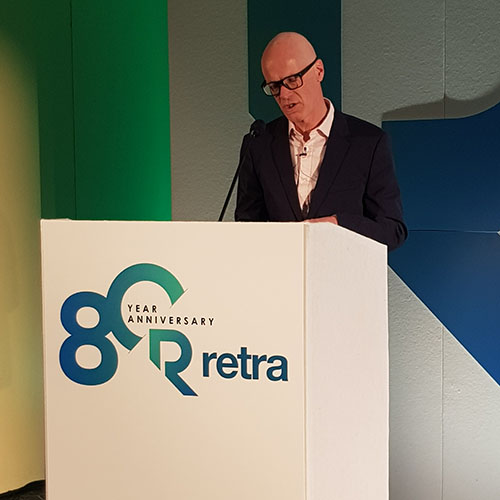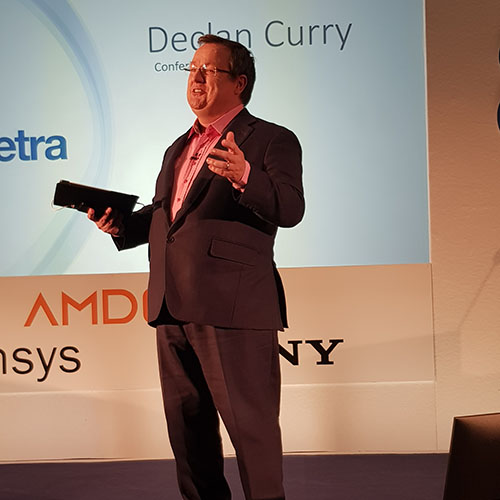At the retailers association’s first conference in three years, Retra’s 69th event presented a packed programme addressing ‘The Challenge of Change”.
In his opening address at the conference on April 5, CEO Howard Saycell reflected on the fact that retailers had coped well with the challenges of the past two years, facing challenges that “no one could have imagined”.
Saycell recalled Retra’s “fury that electrical retailers were not classed as essential” and forced to close during the first lockdown and how it had “lobbied hard” on behalf of its members.
Bringing things up to date, Saycell summarised the challenges ahead for retailers now, including the rising cost of living, increasing national insurance contributions and the prospect of ‘stagflation’ ahead.
On the subject of 2040 retail emissions targets, he warned that retailers would become more of a focus as they account for 30% of carbon emissions in the UK. He said: “Don’t do nothing. Don’t sit back and think it’s years away. Now is the time to build a plan – look at buildings, insulation, vehicles.”
One of the “hot topics” he highlighted was manufacturers selling direct to consumers. He emphasised: “Retra considers the best possible experience for a consumer is when they can view a product, engage with a specialist, have it delivered and installed and be looked after if anything should go wrong.”
Another was the new “online sales tax” which he said the Government intended to alleviate the burden of business rates and called on any retailers with an opinion to submit their views by May through the government website. He questioned whether introducing another tax to fix a tax that was broken was the right thing to do. The topic would be rallied again in a member Q&A session at the end of the day.
Speakers invited to address the conference this year included Amdea CEO Paul Hide, Mark Pilkington from Fire Brand Consulting on why retailers are winning, GfK’s Nick Simon with some market stats, BSH CEO Gunjan Srivastava and Google’s industry manager Richard Hartigan.
Amdea’s Paul Hide addressed conference on the subject of ‘the road to net zero’. He prefaced his address by saying that sales in all major appliance categories were up 10% in 2020 and in a market that exceeded 13m units and was valued at £8 billion. But he warned” “This strong growth cannot continue forever. We must face the 2022 realities of global supply disruptions, microchip and semiconductor shortages, inflationary price rises and a record squeeze on disposable incomes.
“Manufacturers are well aware how frustrating product shortages and lack of exact incoming dates can be, but these are global issues, outside of any one manufacturer’s control, so don’t always shoot the messengers.
“Together, we are an incredibly resilient sector, high on the ‘essential’ list for the majority of households and Amdea expect to see a market opportunity this year very similar to that past two in sales volume and probably higher in terms of sales value due to enforced increased selling prices, so while supply is finite, data proves that supply has grown, not fallen.”
After outlining the areas where brands are targeting improvement and pointing out that consumers are now attaching greater importance to a product’s environmental credentials , he concluded: “We’re not under any illusions that this will be an easy journey, to become a fully net zero industry. However, there is nothing impossible in what needs to be achieved, the technology already exists. It is feasible to accelerate the pace of change so that all appliances meet these requirements within the stated net zero target timescales.”
Consultant Mark Pilkington spoke on how creative retailers are winning in the current market, and outlined how retailers needed to pay attention to the correct use of channels – online and physical – and the advantages of both. The “endless aisles” and convenience of online balanced with the showroom where retailers can energise customers and serve as ‘clubhouses’ and ‘brand theatres’.
The morning also included a retail panel discussion comprising Martin Jukes, Avensys head of retail, Michael Peters MD Paul Mead and Snellings MD Paul Giles.
A hot topic that has long been a Retra concern is direct selling. The panel expressed its views on this threat and shared a consensus that “manufacturers should manufacture and retailers should retail”. We are the solution providers.”
Rounding off the discussion, Paul Giles, MD of Snellings near Norwich said: “We are being used as the showroom for their online. That’s where I think we need to draw the line.”
Moving on to talk about where the market is going, Jukes from Avensys said online sales would continue to be a large part of his business, while Giles of Snellings said “we [retailers] need to be omnichannel and see ourselves as brands”. Jukes concluded: “The future is bright.”
Analyst GfK sent Nick Simon along to set out some market facts and figures. He outlined the vagaries of the economic situation, pointing out that consumer confidence was now [Feb] at -26, from -7 in July 2021. He highlighted that MDA sales in 2021 were strong. In April 2020 sales were down 32.9%, a year later they were up 84% and in January 221 they were up 6.3%. In 2021, sales of MDAs through the independent channel were also up by 21.4% for dishwashers and 13.9% for cooking.
After conference host, journalist and broadcaster Declan Curry, presented his economic overview, BSH CEO Gunjan Srivastava took the stage for his presentation.
Srivastava summarised the economic ups and downs of the past two years, emphasising that 2020 saw the economy grow 7.5% and retail sales rise by 5.1%, but that 2021 was different – furlough ending, consumer confidence declining, rising costs – while also touching on the fact that BSH is still “grappling with” supply-related challenges.
For 2022, he said people would be spending on holidays again, that 54% say they will be more price-driven, but that 42% would still look for quality and reliability. He points out that surveys show that consumers “expect a great experience across all channels”. He then outlined what he saw as a “winning formula”. It is: “A combination of outstanding local service, combined with a highly efficient web presence and the shopfloor where the experience can some alive to complement the information we share on the web. That is the perfect formula to engage the consumer, give high-quality service’ and give the kind of local service the consumer would not like to go away from.”
Goggle’s industry manager Richard Hartigan then did his presentation on how to understand the customer journey, use Google’s services to acquire new customers by using responsive search and find people searching for new terms, using ‘smart shopping’ to find the right people from the data supplied to Google, increase conversion rates and improve profitability.
The conference ended with questions submitted by members put to a panel comprising Robert Hughes, chairman of Hughes Electrical and Retra, Paul Hide of Amdea, Steve Jones, MD of Sirius Buying Group, and Paul Tyler, CEO of CIH, part of the Euronics buying group.
The hottest topic was direct selling and are retailers still relevant? Hide said: Retailers offer a full solution that no manufacturer can. You can’t build a brand online only.”
Hughes pointed out that retailers add value – they go into customers’ houses and install the products. Sirius’s Jones said: “Manufacturers need to be more transparent in what they are doing and I hope they don’t forget how independent retailers help build up their brands over the years. If you lose customer service, you lose the value in your brand.
• For more comments from the conference on direct selling, see separate story

